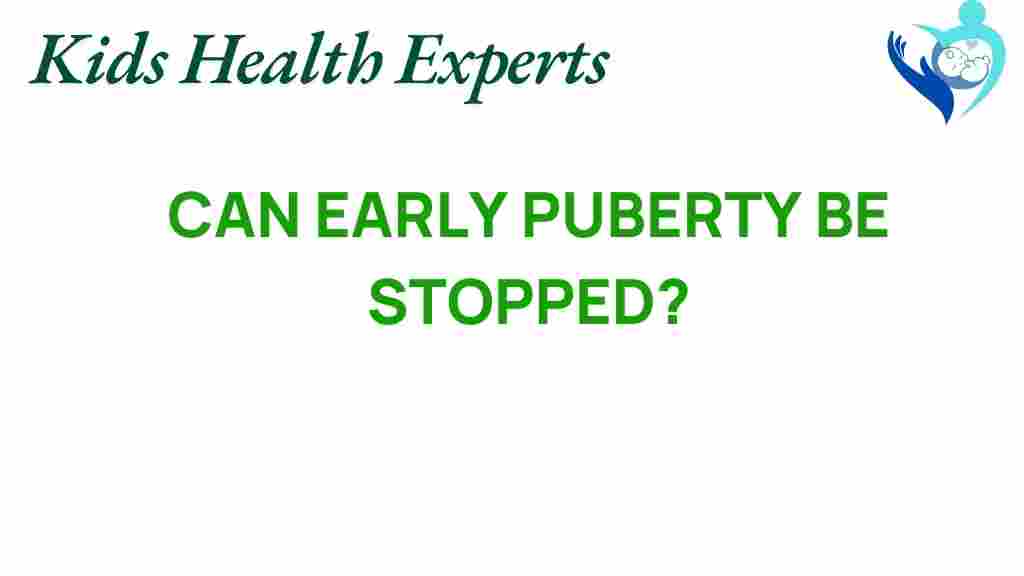The Controversial Quest: Can Early Puberty Be Stopped?
Early puberty, defined as the onset of secondary sexual characteristics before age 9 in boys and before age 8 in girls, has become a topic of significant concern among parents, educators, and healthcare professionals. As childhood development progresses in a world influenced by various biological, environmental, and societal factors, the implications of early puberty raise difficult questions about treatment options and their long-term effects. This article explores the complexities surrounding early puberty, including medical interventions like hormone therapy, the psychological impact on children, and the broader societal implications.
Understanding Early Puberty
Early puberty, or precocious puberty, can be attributed to various factors, including genetics, environmental influences, and hormonal imbalances. It is essential to understand how early puberty differs from normal puberty and its potential effects on children’s physical and emotional health.
Common Signs of Early Puberty
Parents and caregivers should be aware of the signs of early puberty, which may include:
- Development of breasts in girls
- Menstruation before age 9
- Testicular enlargement in boys
- Pubic and underarm hair growth
- Rapid growth spurts
Causes of Early Puberty
Several factors can contribute to early puberty:
- Genetics: Family history can play a role.
- Obesity: Excess body fat can influence hormone levels.
- Environmental Factors: Exposure to endocrine disruptors in plastics and chemicals.
- Medical Conditions: Certain abnormalities in the brain or hormonal systems.
Medical Intervention for Early Puberty
When early puberty is diagnosed, medical intervention may be necessary to manage its effects. This typically involves hormone therapy, which aims to pause or slow down the progression of puberty in affected children.
Hormone Therapy: An Overview
Hormone therapy for early puberty often includes the use of medications such as:
- GnRH Agonists: These drugs reduce the body’s production of sex hormones and can effectively delay the onset of puberty.
- Estrogen Blockers: In girls, medications may inhibit estrogen production.
- Testosterone Blockers: In boys, medications may inhibit testosterone effects.
These treatments are typically administered under the guidance of a pediatric endocrinologist and are closely monitored for effectiveness and side effects.
Benefits of Medical Intervention
The primary goal of hormone therapy is to:
- Delay the physical changes associated with early puberty.
- Allow children to grow and develop at a more age-appropriate pace.
- Reduce the risk of psychological distress.
Potential Risks and Considerations
While hormone therapy can be effective in managing early puberty, it is not without risks. Potential concerns include:
- Side Effects: Hormonal treatments can lead to various side effects, including headaches, nausea, and mood swings.
- Long-Term Effects: The long-term implications of delaying puberty remain a subject of ongoing research.
- Emotional Impact: Children may experience feelings of confusion or frustration about their treatment.
The Psychological Impact of Early Puberty
The onset of early puberty can have significant psychological effects on children. Understanding these impacts is crucial for parents and healthcare providers in providing appropriate support.
Emotional and Social Challenges
Children experiencing early puberty may face several emotional and social challenges, including:
- A sense of isolation from peers due to physical differences.
- Increased anxiety and depression related to body image and self-esteem.
- Pressure to conform to societal expectations regarding maturity.
Importance of Support Systems
Creating a supportive environment for children experiencing early puberty is essential. This support can come from:
- Parents and family members who provide reassurance and understanding.
- School counselors who can offer guidance and emotional support.
- Healthcare professionals who can facilitate open discussions about changes and feelings.
Treatment Options for Early Puberty
When considering treatment for early puberty, it is important to explore various options available to families. The choice of treatment should be based on individual circumstances and guided by medical professionals.
Non-Medical Interventions
In some cases, non-medical interventions may be appropriate:
- Counseling: Therapy can help children navigate emotional challenges.
- Education: Providing age-appropriate information about puberty can help demystify the changes.
- Healthy Lifestyle: Encouraging a balanced diet and regular exercise can support overall health.
Medical Treatment Plans
For children requiring medical intervention, a comprehensive treatment plan may include:
- Regular monitoring of growth and development.
- Adjustments to hormone therapy based on individual responses.
- Collaboration with a team of healthcare professionals, including endocrinologists and psychologists.
Societal Implications of Early Puberty
Early puberty also has broader societal implications that merit consideration. As childhood development continues to evolve, understanding the societal context is essential for addressing early puberty.
Changing Norms and Expectations
As societal norms shift, expectations regarding childhood and maturity have changed. Some implications include:
- The pressure on children to mature faster due to social media and cultural influences.
- Increased scrutiny on children’s health and development from parents and educators.
- The need for advocacy and awareness about early puberty and its effects.
Addressing Public Health Concerns
Early puberty has become a public health concern, highlighting the need for:
- Increased research on the causes and consequences of early puberty.
- Public health campaigns to educate families about signs and symptoms.
- Access to healthcare resources for affected children.
In conclusion, early puberty presents a complex challenge that requires careful consideration of medical interventions, psychological impacts, and societal implications. While hormone therapy can be an effective treatment option, it is vital to weigh the benefits against potential risks. Creating supportive environments for children and engaging with healthcare professionals is essential in navigating this controversial quest. By fostering awareness and understanding, we can better address the challenges associated with early puberty and support the healthy development of our children.
For more information on pediatric health and early puberty, consider visiting this resource. Additionally, for support and community discussions, you can explore this forum.
This article is in the category Conditions and created by KidsHealthExperts Team
